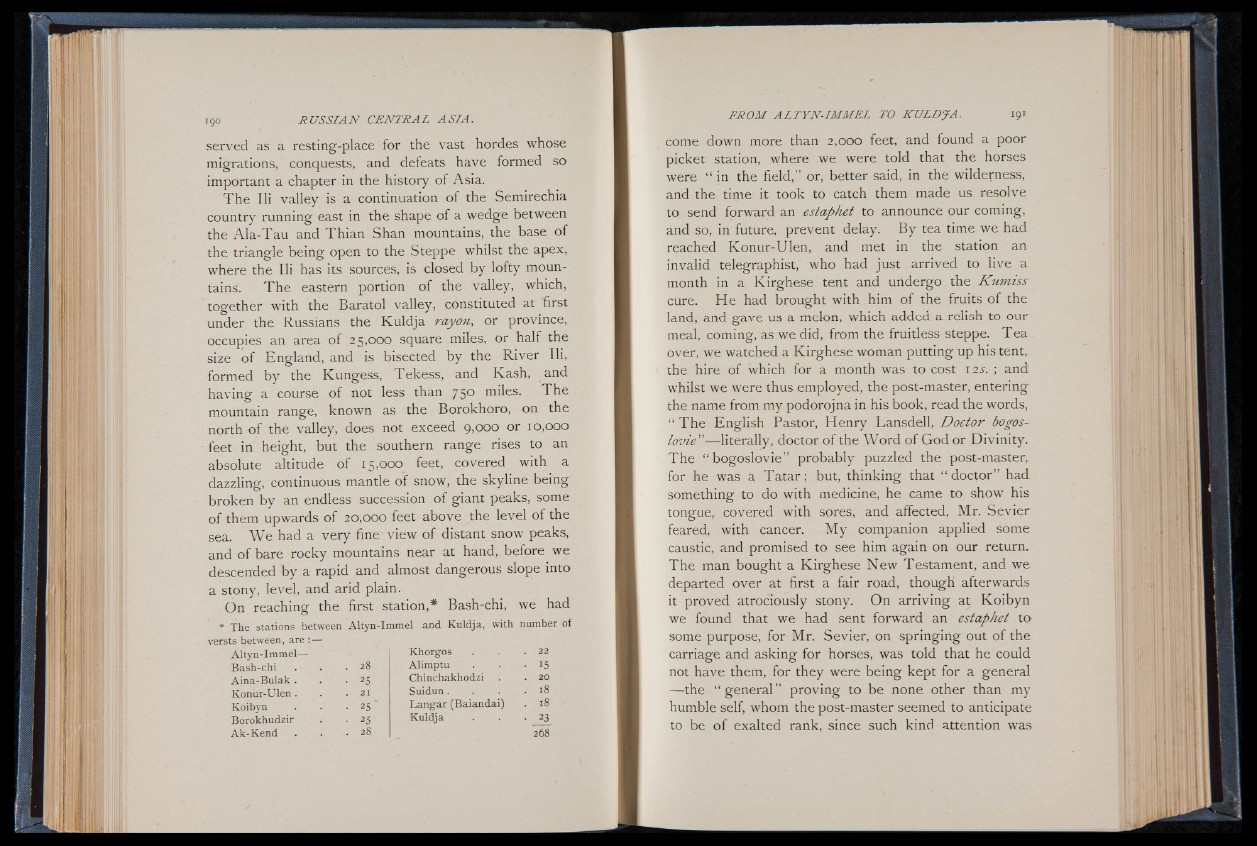
served as a resting-place for the vast hordes whose
migrations, conquests, and defeats have formed so
important a chapter in the history of Asia.
The Ili valley is a continuation of the Semirechia
country running east in the shape of a wedge between
the Ala-Tau and Thian Shan mountains, the base of
the triangle being open to the Steppe whilst the apex,
where the Ili has its sources, is closed by lofty mountains.
The eastern portion of the valley, which,
together with the Baratol valley, constituted at first
under the Russians the Kuldja rayon, or province,
occupies an area of 25,000 square miles, or half the
size of England, and is bisected by the River Ili,
formed by the Kungess, Tekess, and Kash, and
having a course of not less than 750 miles. The
mountain range, known as the Borokhoro, on the
north o f the valley, does not exceed 9,000 or 10,000
feet in height, but the southern range rises to an
absolute altitude of 15,000 feet, covered with a
dazzling, continuous mantle of snow, the skyline being
broken by an endless succession of giant peaks, some
of them upwards of 20,000 feet above the level of the
sea. We had a very fine' view of distant snow peaks,
and of bare rocky mountains near at hand, before we
descended by a rapid and almost dangerous slope into
a stony, level, and arid plain.
On reaching the first station,* Bash-chi, we had
* The stations between Altyn-Immel and Kuldja, with number of
versts between, are :—
Altyn-Immel— Khorgos . 22
Bash-chi . . . 28 Alimptu • 15
Aina-Bulak . • 25 Chinchakhodzi . 20
Konur-Ulen . . 21 Suidun . . 18
Koibyn - 2 5 ' Langar (Baiandai) . 18
Borokhudzir - 25 Kuldja ‘ J i
Ak-Kend . 28 268
come down more than 2,000 feet, and found a poor
picket station, where we were told that the horses
were “ in the field,” or, better said, in the wilderness,
and the time it took to catch them made us resolve
to send forward an estaphet to announce pur coming,
and so, in future, prevent delay. By tea time we had
reached Konur-Ulen, and met in the station an
invalid telegraphist, who had just arrived to live a
month in a Kirghese tent and undergo the Kumiss
cure. He had brought with him of the fruits of the
land, and gave us a melon, which added a relish to our
meal, coming, as we did, from the fruitless steppe. Tea
over, we watched a Kirghese woman putting up his tent,,
the hire of which for a month was to cost 12s. ; and
whilst we were thus employed, the post-master, entering
the name from my podorojna in his book, read the words,
I The English Pastor, Henry Lansdell, Doctor bogos-
lovie ’^-literally, doctor of the Word of God or Divinity.
The “ bogoslovie” probably puzzled the post-master,
for he was a Tatar; but, thinking that “ doctor” had
something to do with medicine, he came to show his
tongue, covered with sores, and affected, Mr. Sevier
feared, with cancer. My companion applied some
caustic, and promised to see him again on our return.
The man bought a Kirghese New Testament, and we
departed over at first a fair road, though afterwards
it proved atrociously stony. On arriving at Koibyn
we found that we had sent forward an estaphet to
some purpose, for Mr. Sevier, on springing out of the
carriage and asking for horses, was told that he could
not have them, for they were being kept for a general
— the “ general” proving to be none other than my
humble self, whom the post-master seemed to anticipate
to be of exalted rank, since such kind attention was